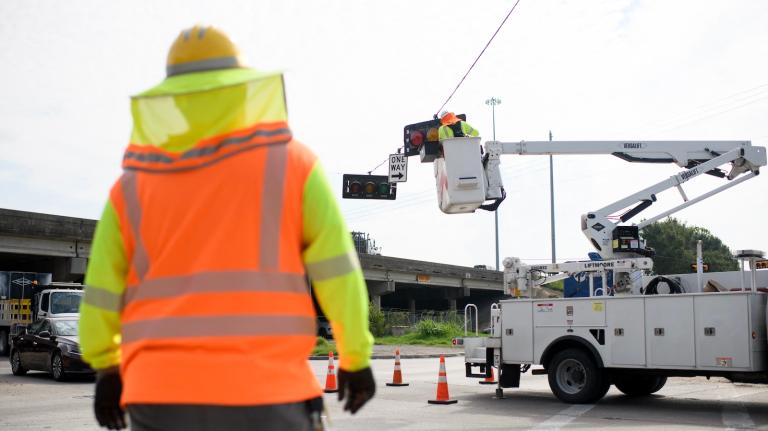
Senate Majority Leader Harry Reid (D-Nev.) today signaled that energy policy will be a major focus for Congress in the next months, announcing plans to introduce a bill later this week that would give the federal government greater authority in siting electrical transmission lines around the country.
“What we’re talking about doing is making it possible for this energy we’re creating all over the United States … to get it where it’s needed,” said Reid at the “National Clean Energy Project” event in Washington, D.C., an event sponsored by the Center for American Progress Action Fund.
Reid’s bill would allow the president to designate “renewable energy zones” – parts of the country that can generate more than one gigawatt of electricity from renewable sources for at least 30 percent of the year but that lack the infrastructure needed to deliver that power to other regions. .
The news is big for several reasons. One, modernizing and expanding the transmission system is essential to expanding renewable energy generation and reaching the renewable portfolio goals outlined by President Obama and many congressional leaders. But any expansion means building new transmission lines, a move sure to reignite debate about how much authority the federal government should have when it comes approving new lines. Previous attempts to expand the authority of the Federal Energy Regulatory Commission (FERC) have been unsuccessful due to concerns on the part of state regulators about eminent domain — essentially, the government’s power to seize land.
A 2005 law granting FERC some greater authority to intervene in transmission line disputes hasn’t been used successfully to date, and just last week a federal appeals court ruled against the agency after they attempted to intervene and move forward on a 190-mile high-voltage power line in upstate New York.
The economic recovery package that President Obama signed last week set aside $11 billion dollars for transmission upgrades, evidence of increased interest building a national, smart grid. Reid offered tough words on Monday to anyone who would oppose the federal government’s grid plans.
“We’re going to move beyond one state being able to hold up forever something that needs to be done for the country,” said Reid. “Whatever we pass at the federal level trumps all that.”
“The problems we have in America today, in the world today, have solutions. We cannot let 231 state regulators kill that progress,” Reid continued later in response to a question from a reporter on eminent domain concerns. “Now, they will be given every opportunity to see if we can work this out … [But] as we’ve done with railroads, as we’ve done with highways, as we did with broadband, there comes a time when the federal government has to step in.”
Reid’s senior energy adviser, Chris Miller, told reporters that the bill will likely be released on Thursday morning, and will address issues like siting and costs, as well as a “green component” – i.e., what sorts of energy would qualify under the plan.
Reid’s bill would be referred to the Energy and Natural Resources Committee, whose chairman, Jeff Bingaman (D-N.M.), was also present at the clean energy gathering. Bingaman indicated to reporters that the bill would likely be included in a forthcoming energy package that he is working on. He said he had yet to see Reid’s bill, but he would “generally agree that FERC should have more authority in planning and siting and cost allocation.” He acknowledged, though, that state regulators would be important to the discussion. “I think state regulators are going to have to have a big say in how we allocate authority in this area, so we need to hear them out on it,” said Bingaman.
Though Reid said last week that the energy package could be expected in two weeks, Bingaman said that estimate was “a little optimistic.” A bill would be more likely to come out of his committee in four to six weeks, he said, and would also include a renewable electricity standard (which his committee has already discussed) and efficiency measures.
The rest of today’s policy gathering, though interesting, didn’t provide much in the way of news. Attendees included Reid, Bingaman, House Speaker Nancy Pelosi (D-Calif.), former president Bill Clinton, former vice president Al Gore, Interior Secretary Ken Salazar, Energy Secretary Steven Chu, Sen. Byron Dorgan (D-N.D.), Rep. Ed Markey (D-Mass.), oil-tycoon-turned-wind-evangelist T. Boone Pickens, Center for American Progress Action Fund President John Podesta, green jobs guru Van Jones, former Wal-Mart CEO Lee Scott, SEIU president Andy Stern, former New York Gov. George Pataki (R), and a number of other leaders in the energy, renewable power, environmental, and labor sectors.


